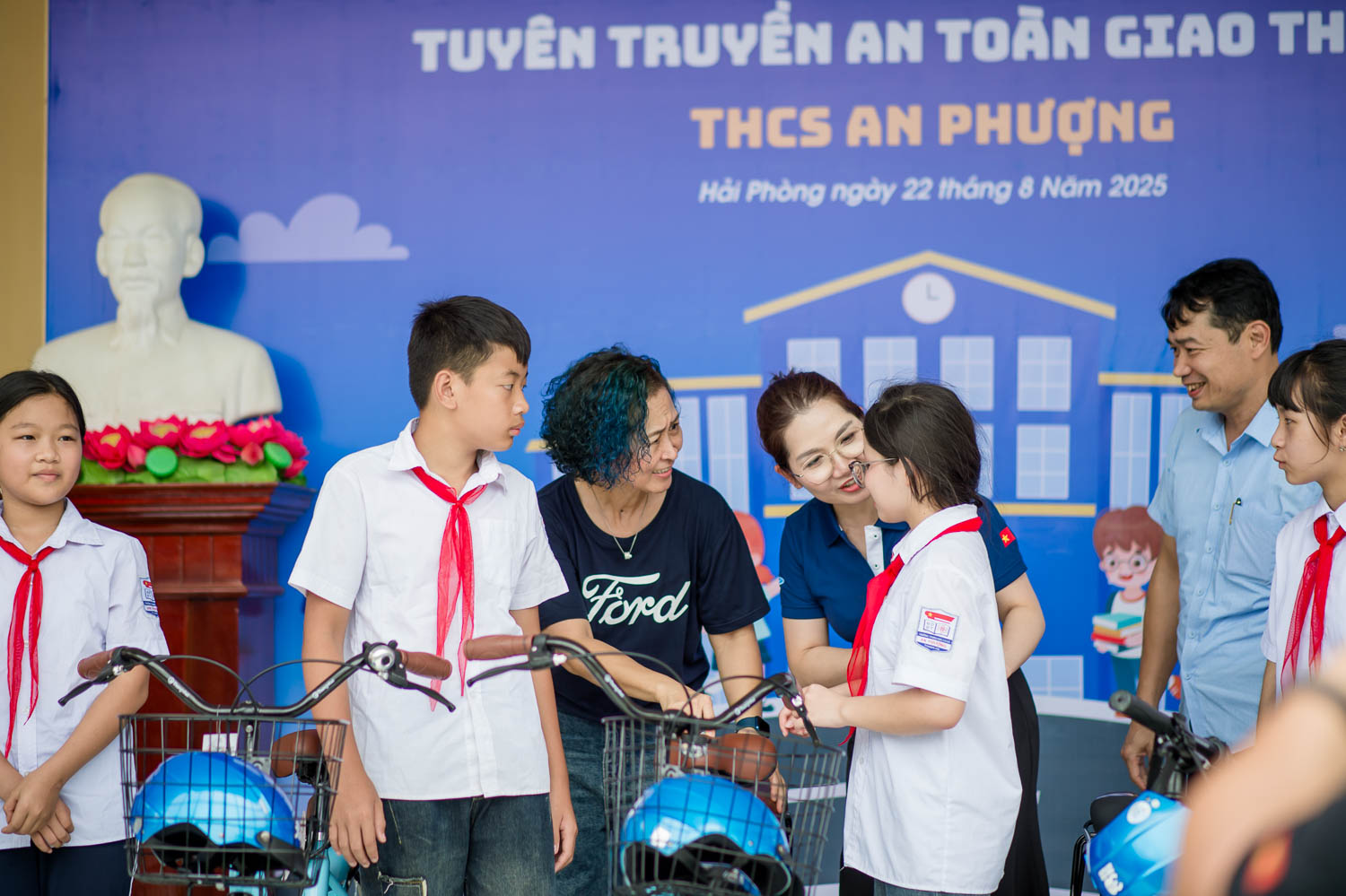Over the past three decades in Vietnam, Ford has grown into the country’s largest foreign automotive investor and a provider of safe mobility solutions. But beyond business, the company has consistently partnered with local communities to support long-term, sustainable development.
Joining hands to improve infrastructure and community capacity
In September, Ford Vietnam launched its annual “Global Caring Month” campaign, joining Ford Motor Company operations in more than 30 countries. The initiative focuses on four pillars—education, disaster response, community infrastructure, and safety awareness—considered essential foundations for sustainable growth.
At An Phuong Secondary School in Haiphong City, nearly 60 Ford employees helped build new restrooms, repair the parking area, repaint classrooms, and improve study spaces. The team also donated bicycles and helmets to students, creating a cleaner and safer learning environment and promoting road-safety awareness.
In Hanoi City, Ford worked with a social organization to turn an abandoned plot into a community space, which now includes a playground, fitness area, and learning zones on traffic safety, science, and environmental education.
In Chieng Di (Son La Province), the company installed 60 solar-powered streetlights, repaired roads, provided crop seeds, and organized training sessions on sustainable agriculture. These activities are helping farmers increase productivity and household incomes.
In Khau Pha (former Yen Bai Province), Ford implemented a soil-erosion control project by planting vetiver grass and building embankments along streams to protect farmland for 80 households. The company also renovated the village cultural house into a community center and supported community-based tourism initiatives, helping local families develop more stable livelihoods.
Alongside these projects, Ford provided disaster-response and first-aid training to more than 300 teachers, drivers, and migrant workers, equipping them with essential life-saving skills.
Ford Hai Duong’s board of management and social partners also visited Ta Tau Village in the former province of Yen Bai to donate supplies and support low-income households. In addition, it donated engines and gearboxes to technical universities—such as Bac Giang Agriculture and Forestry University and the University of Industrial Technology—to help students access modern automotive technology and build practical, industry-ready skills.
“Global Caring Month has become a meaningful tradition that reflects Ford’s long-term commitment to the community and to building a safe, healthy environment for future generations,” said Hoang Thi Thanh Tam, deputy general director of Ford Vietnam.
The impact of Ford’s ecosystem
During the same period, Ford’s global dealer network ran the “Food Drive” campaign from September 15 to 25 to help address food insecurity worldwide. According to the United Nations, some 733 million people faced hunger in 2024, underscoring the importance of the initiative and the spirit of “building together.”
Globally, Ford has contributed more than US$2.4 billion to charitable activities and logged over 1.8 million volunteer hours by employees.
In Vietnam, Ford dealerships and owner clubs also took part by organizing dozens of charity programs providing clothing, food, and Mid-Autumn Festival gifts to children in mountainous provinces such as Yen Bai, Son La, and Cao Bang. These efforts help students stay in school and support struggling families during times of scarcity.
This collective involvement highlights the growing role of Ford’s ecosystem in Vietnam—where dealers, partners, and users contribute not only to commercial operations but also to broad-based social responsibility.
Thirty years of Ford in Vietnam
Ford Motor Company’s decision to invest in Vietnam in 1995 helped lay the foundation for the country’s modern automotive industry and marked an important milestone in Vietnam–U.S. relations in the early years of economic normalization.
Shortly after receiving its investment license, Ford built an assembly plant in Hai Duong Province (now administratively part of Haiphong City). In 2020, the company invested an additional US$82 million to expand the facility, increasing its annual production capacity to 40,000 vehicles, creating more than 1,200 jobs, and preparing for the production of next-generation models for the Asia–Pacific region.
With a total investment of more than US$200 million, Ford Vietnam is currently the largest foreign automotive investor in the country and a pioneer in green mobility and sustainable manufacturing.
Its product strategy and understanding of the local market have helped Ford achieve strong performance across several key models: the Ranger has dominated the pickup segment for years; the Everest leads the mid-size SUV category; the Transit remains the top commercial vehicle; and the newer Territory quickly entered the list of Vietnam’s top 10 best-selling models. Ford now has 56 dealerships and branches nationwide, strengthening its reach and customer service capabilities.
From business growth to sustainable development
Entering its 30th year in 2025, Ford aims not only to expand its investments but also to reinforce its development philosophy built on three pillars: people, community, and the environment.
Ford Vietnam’s corporate social responsibility programs have become more structured and comprehensive—ranging from educational support, environmental protection, and disaster-preparedness training, to promoting renewable energy and community-based tourism. This approach reflects Ford’s evolving definition of its corporate role: not just an automaker, but a long-term partner to local communities.
“Building together”—Ford’s global and Vietnam-wide slogan—is becoming a unifying force connecting employees, dealers, customers, and partners around a shared goal: creating a greener, safer, and more humane future.









